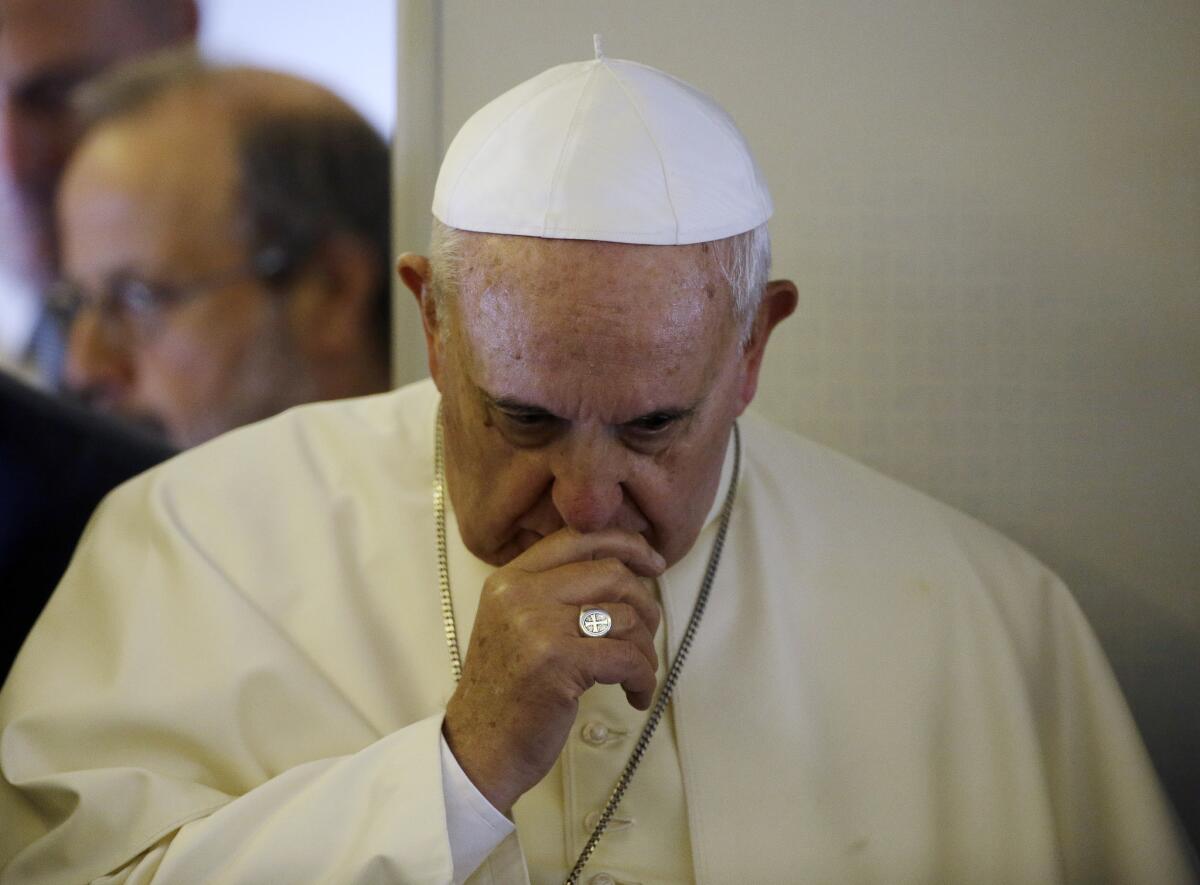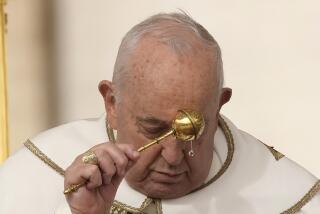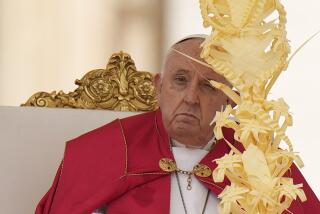Pope Francis ‘deeply saddened’ by deaths of three relatives

Pope Francis was “deeply saddened” to learn of the deaths of three relatives in a car crash Tuesday on a provincial highway in Argentina, the Vatican said.
An Argentine police official quoted by the Associated Press said the pope’s 38-year-old nephew, Emanuel Bergoglio, was driving his wife and two children, aged 2 and 8 months, when the car hit the back of a truck. Bergoglio was hospitalized and his family was killed.
The family was reportedly returning to Buenos Aires following a holiday weekend when the crash happened between the cities of Rosario and Cordoba.
“The Pope has been informed of the tragic accident in Argentina involving family members, and he is deeply saddened,” the Vatican said in a statement. “He asks all those who share his grief to unite with him in prayer.”
In a candid discussion with reporters about his own mortality, Pope Francis suggested Monday he has just two or three years to live and may retire before then.
The 77-year-old pontiff made the comments during a conversation with reporters on his flight home from a five-day visit to South Korea.
Asked how he is coping with his massive popular appeal, Francis said, “I try to think of my sins, my mistakes, so as not to think that I am somebody. Because I know this will last a short time, two or three years, and then to the house of the Father.”
The pope admitted his busy schedule had worn him down this year, recalling how he had pulled out of a visit to a Rome hospital in June. “Now I have to be a little more prudent,” Francis said.
He said the last holiday he had taken outside Buenos Aires, where he was archbishop before becoming pope last year, was in 1975. But he said he was able to relax without leaving home.
“I change rhythm. I sleep more, I read the things I like. I listen to music. That way I rest. In July and part of August I did that,” he said.
Francis said he suffered from “some nerve problems,” but joked he kept the problem under control by drinking mate, an Argentine tea.
He hinted he might at some point follow the example of his predecessor, Pope Benedict, and retire.
“Let us think about what he said,” Francis said of Benedict. “‘I have gotten old. I do not have the strength.’ It was a beautiful gesture of nobility, of humility and courage.”
“I would do the same,” he added. “I would pray, but I would do the same. He opened a door that is institutional, not exceptional.”
However, during talk of his planned trips -- including possible stops in New York and Washington when he travels to Philadelphia next year -- it became clear Francis has no intention of slowing down any time soon. He said he was prepared to visit northern Iraq, too, although he added “at the moment, it is not the best thing to do.”
Francis also said that the way had been opened to eventually elevate El Salvador’s late Archbishop Oscar Romero to sainthood.
Romero was killed by Salvadoran death squads as he celebrated Mass in 1980, and he remains a potent and revered symbol among many in Latin America. His canonization was blocked, however, by conservative popes John Paul II and Benedict XVI, who opposed the more liberal Catholic currents that informed Romero’s advocacy for the poor.
“The process was blocked in the Congregation for the Doctrine of the Faith ‘for prudence,’ it was said,” Francis told reporters. “Now it is unblocked” and will follow the normal vetting process, he said, adding that “it’s very important to move in haste.”
“There are no impediments,” Francis said.
The congregation the pope referred to ensures that priests follow the church’s teachings strictly. It was run under John Paul by Cardinal Joseph Ratzinger, who went on to become Benedict.
They launched a crackdown on liberation theology, especially in Latin America, where the church prioritizes work for the poor but also became associated with Marxism in some regions.
Another sticking point in Romero’s case is whether he is a martyr. Supporters think so, because he was killed carrying out his priestly duties. Others argue he was slain not for his faith, but for his political leanings, which were increasingly critical of what he saw as a repressive army and government.
The distinction is important. Martyrs can be beatified, the first step to sainthood, without the usual requirement of having a miracle attributed to them. Like others, however, they still need a miracle for the final elevation to sainthood.
Francis said these issues need to be cleared.
“For me,” the Argentine pope added, “Romero is a man of God.”
Kington is a special correspondent. Times staff writer Tracy Wilkinson in Mexico City contributed to this report.
More to Read
Start your day right
Sign up for Essential California for news, features and recommendations from the L.A. Times and beyond in your inbox six days a week.
You may occasionally receive promotional content from the Los Angeles Times.






